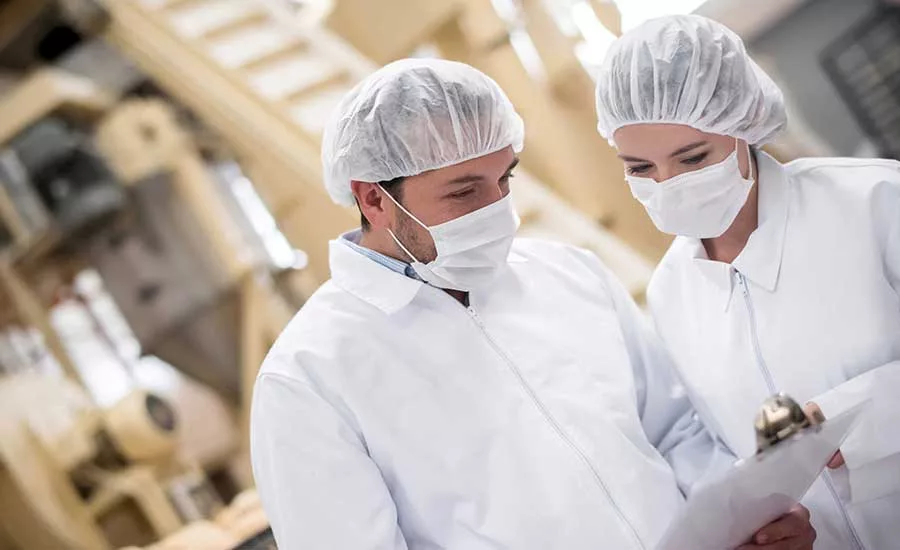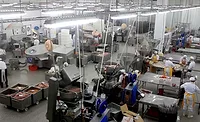Critical Attributes of a Successful Food Safety and Quality Organization: FSQA on the Floor
What does it take to have an extremely effective FSQA technician team on the production floor?

Let's forget about senior leaders, management, and executive teams for the moment. What does it take to have an extremely effective Food Safety and Quality Assurance (FSQA) technician team on the production floor?
This article shares practiced perspective on "what it takes." Attributes for success are identified and explained. How they are integrated within an FSQA team on the floor will go a long way to galvanizing the success of that team. For food and beverage companies, "success" means effective risk identification and management, protection of public health, reduced costs of poor quality, and the manufacture and sale of high-quality food and beverage ingredients and products.
Very common in food companies is an FSQA team focused (by themselves, and by their management) on products. This makes perfect sense because products are the output of the company—these are the treasures upon which the company thrives. They are, hopefully, also the treasures of a happy customer and consumer base.
This article focuses on people. What are the key performance factors inherent to a group of FSQA individuals whose job is making sure that their company's products are extremely safe for consumption, and are of the quality that their customers and consumers demand?
Key Performance Factors
Four main factors delineate effective behaviors on the part of the quality team on the production floor: functional mastery, problem-solving skills, decision-making, and communication. Phrased in a more active way, these skills are master, assess, decide, and tell. They are aspirational, yet they are also measurable. They also tend to build on each other, as indicated in Figure 1.

Each of these four factors is discussed in this article. Some readers may think that these factors apply to many (if not most) functions within a successful food company—that is correct. At the basic level, effectiveness at a job can be dimensioned independently of the job. What is discussed below are the special skills needed specifically by the FSQA team within the structure of these four factors.
Functional Mastery—"Master"
Functional mastery can be defined as broad and deep knowledge of one's functional area, with proven ability to apply that knowledge and experience base. It also means the ability and willingness to share insights and hypotheses with others in an involving and inclusive manner. Doing so readily, quickly, and often during a problem investigation will help the entire team identify possible solutions much more quickly, especially for non-routine issues.
Looking for quick answers on food safety topics?
Try Ask FSM, our new smart AI search tool.
Ask FSM →
What are the important mastery attributes for the FSQA technician? Regulations, science, and technology. First and foremost, the federal and state regulations governing the business must be thoroughly understood. The most obvious reason for doing so is that by not following the rules (especially the legal ones), the company puts itself at great risk. The perhaps less-obvious reason is that many of the regulations are actually founded on best practice (e.g., sampling plans, cooking and cooling processes, handling of allergens).
The science aspect of mastery relates to learning the basic interactions of the ingredients in the company's products, and how they can be affected during handling and processing. A technician does not need to become a chemist, but should understand how pH or temperature might affect the quality of the final product (e.g., for emulsions or pastes). Related to this is the technology aspect of mastery. This means understanding the basic unit operations involved in the manufacturing of the product (e.g., mixing, flow-through pipes, dilution), and how variations in these could affect the final quality of the product.
These examples do not apply to all situations/products, of course. For example, microbiology (environmental pathogens) may be very important. Thus, the admonition here is to make sure that the most important regulations, science, and technology overarching the business must be identified outright. Then, processes and procedures should be put in place to ensure that FSQA floor personnel are effectively and regularly trained and held accountable for mastering these aspects.
The best FSQA technicians are viewed by their colleagues as subject matter experts. They master.
Problem-Solving Skills—"Assess"
Problem-solving skills can be defined as the ability to analyze issues and challenges systemically, while using data and instincts. This also includes the responsibility to explain the analysis, insights, and conclusions to non-experts. Putting an issue "in plain language" helps others (especially in production and senior management) understand the issue better and what can be done about it.
What are the important problem-solving attributes for the FSQA technician? Assessing risk, making judgments, and explaining them are essential. First and foremost, a key to problem-solving is being able to look at the issue beyond just the issue itself. It is rare that a specific problem has a single cause, let alone one that is solely related to the issue. Skills must be developed that allow the entire situation to be looked at systemically—what is connected, what is the sequence, what are the dependencies? An error made by a production operator (e.g., putting a wrong ingredient in a mix) is likely not as simple of a mistake as it seems on the surface. Other factors may be at play that must be investigated (e.g., training of the operator, staging of ingredients, labeling of ingredients). Excellent problem-solving identifies the root cause and allows a well-rounded assessment of the risk that the issue is bringing to the business.
The best of analyses can falter if the FSQA technician cannot explain to others the problem and its probable solutions. Pushback is a guarantee when the FSQA team proposes a solution that is counter to a current way of working. The FSQA team can get the broader organization involved constructively in problem-solving by sharing issues in an effective manner.
Problems occur all the time. Sometimes they are repetitive, and sometimes they are simply new issues. It is important to have the necessary technical mastery to solve them, and the necessary structure in the organization to be able to problem-solve. This is very different than simply trying to solve each problem at the level of the problem itself. Better to have an organizational culture that understands how to solve problems in the holistic sense (process thinking at a systemic level).
The best FSQA technicians are viewed by their colleagues as able to solve any problem, and so they are sought out for that skill. They master and they assess.
Decision Making—"Decide"
Decision-making skills can be defined as making a reasoned judgement on an issue, choosing among alternatives, and then assuming accountability for the decision made. They include the ability to delegate decision-making wisely, especially to build organizational strengths. They also include not letting the pressures of the organization (e.g., other functions, having to ship product) override making the right decision for the company.
What are the important decision-making attributes for the FSQA technician? Making a decision, implementing it, and being accountable for the consequences. First and foremost, the FSQA employee on the floor must be able to make a decision, as obvious as this may sound. Yet, truly deciding something means making a choice, and some people are reluctant or incapable of doing so. Fear of making the wrong decision is often a factor, but making no decision (and, therefore, allowing a problem to continue) can have worse consequences.
Being able to make a decision is predicated on the FSQA employee having the necessary functional and technical skills, and using these skills to assess the reality and extent of the problem. Solidifying these skills vastly increases the probability of the right decision being made.
Not all immediate decisions are right or optimal, however. While an assessment continues for a better solution (e.g., a decision being made to solve an urgent issue, versus a better decision being made later to eliminate the root cause), this means that the decision needs to be managed as is. Time spent agonizing over "is this the right decision" or "we need to change our mind" is counter-productive. It could very well be that managing by a decision made (i.e., sticking with it) is far more useful than waiting for a "better" decision.
In the meantime, though, the FSQA technician needs to be accountable for the decision that was made. The technician is impacted by how the company operates, so they must be able to defend their decisions. The best FSQA technicians are fully equipped to do so because they know what they are talking about (they master), and they know which problems need to be attacked (they assess)—hence, they can suggest or instruct how to solve those problems (they decide).
Communication—"Tell"
Communication skills can be defined as demonstrating clarity, directness, inclusiveness, and timeliness of communication, both written and verbal. Clarity is to be understood; directness is so that others see a sense of urgency and the reasons why; inclusiveness is to ensure that others' ideas are included; and timeliness, perhaps the most important factor, is critical to match the urgency of the issue.
What are the important communication attributes for the FSQA technician? Up-and-down communication, along with courage. The communication of an issue must involve more than just the people immediately involved (e.g., production operators). Depending on the severity and risk of the situation, the FSQA technician also needs the skills and courage to communicate to different levels of the organization and across functions. Otherwise, the problem may not get solved, and interpersonal relationships may become damaged instead. Worse, the true root cause may not be identified.
As is natural for a position that has the authority to stop production, doing so at times requires initiative and tenacity. This is especially a challenge in the face of cross-functional hierarchy. The best FSQA technicians have a solid technical foundation (they master), the skills to hone in on the problem (they assess), and the experience and ability to decide what needs to be done (they decide). If these tenets are in place, then it is much easier to stick with one's position (they tell).
Additional Foundational Skills
Organizations might value some other skills as more important than the ones described above, especially those skills that are complementary to their operations. These can include teamwork, planning, and organizing.
Teamwork requires working with others, and potentially even being part of building a high-powered team. For the FSQA technician, being part of a team of other FSQA technicians could be useful (e.g., across shifts, developing new procedures). It could be argued, however, that a technician working alone with the four primary skills discussed above can still be extremely effective at protecting the company and protecting public health. Clearly, those technicians who develop and lead teams might be good candidates for higher-level jobs.
Planning skills also need to exist in an FSQA organization. Criticalities such as training, production schedules, and resources are dependent on good planning. Not every FSQA technician needs to be a good planner, although the best ones probably are—and they may be good candidates for higher-level (or different) roles in the organization.
Organizing skills also are critical in the FSQA team; otherwise, there would be chaos. Again, not all FSQA technicians need to be great organizers; they just need to fit into the organization that develops. Those who are great organizers will likely find themselves in higher-level positions.
Although beyond the scope of this article, here is a question: As the FSQA technician grows in skill development, is it always in everyone's best interest that the technician be promoted into a management role and/or moved into another function?
Summary
Building a robust FSQA organization requires strong and effective leadership, not only in the FSQA function but also in the senior leaders of other functions. It also requires that the FSQA employees who are on the production floor be trained in the skills critical to success. Four attributes, outlined within this article, are key to the effectiveness of the FSQA technicians at protecting the company and its products from food safety risks. These four factors can be measured, trained against, and implemented—and they also build on each other:
- "Master"—Functional mastery
- "Assess"—Problem-solving
- "Decide"—Decision-making
- "Tell"—Communication.
Said another way, skill development must start with No. 1, and then progress sequentially upward to achieve the best synergy and sustainable success. As may be evident from studying the four factors, "communication" is actually part of each one. Communication is likely the most leverageable of the four factors.
Talk for success.
Bob Lijana, M.Sc., has held director- and VP-level positions in food safety, quality, and operations for over 35 years at companies producing ready-to-eat foods, prepared meals, and pasteurized juices. He has a B.Sc. and an M.Sc. in chemical engineering from the Massachusetts Institute of Technology and the University of California–Berkeley, respectively.







.webp?t=1721343192)
